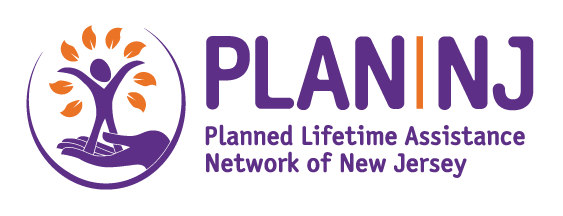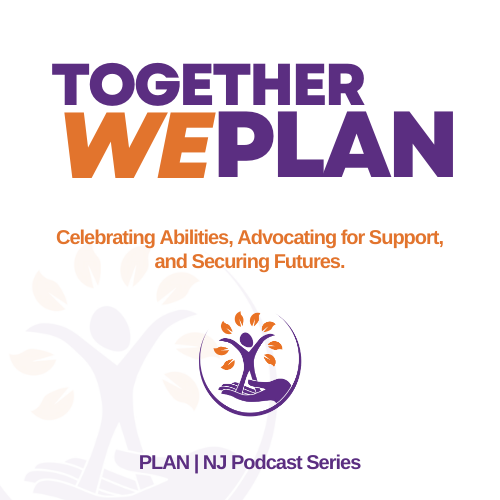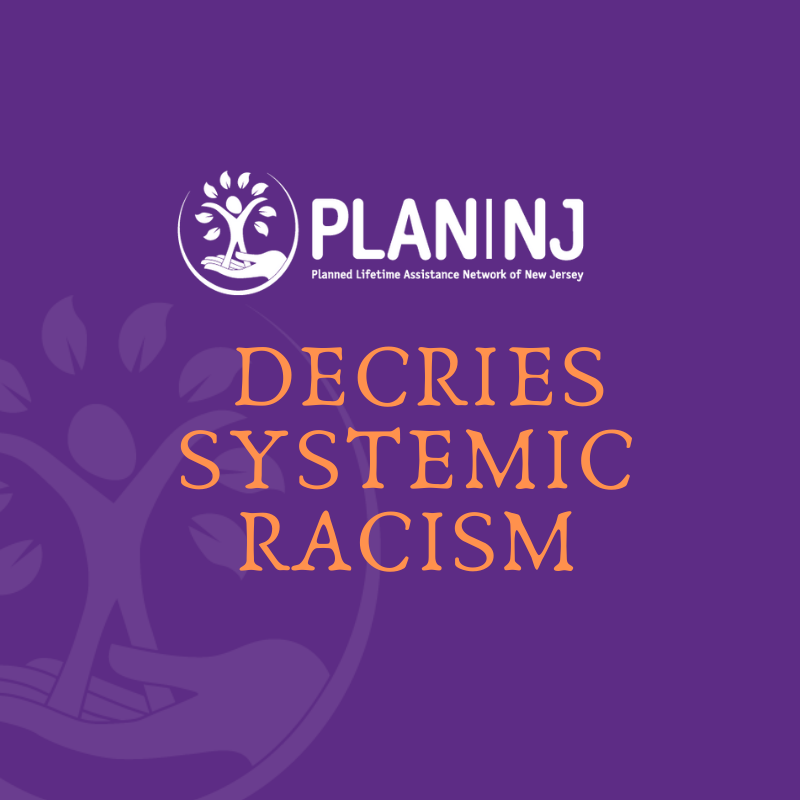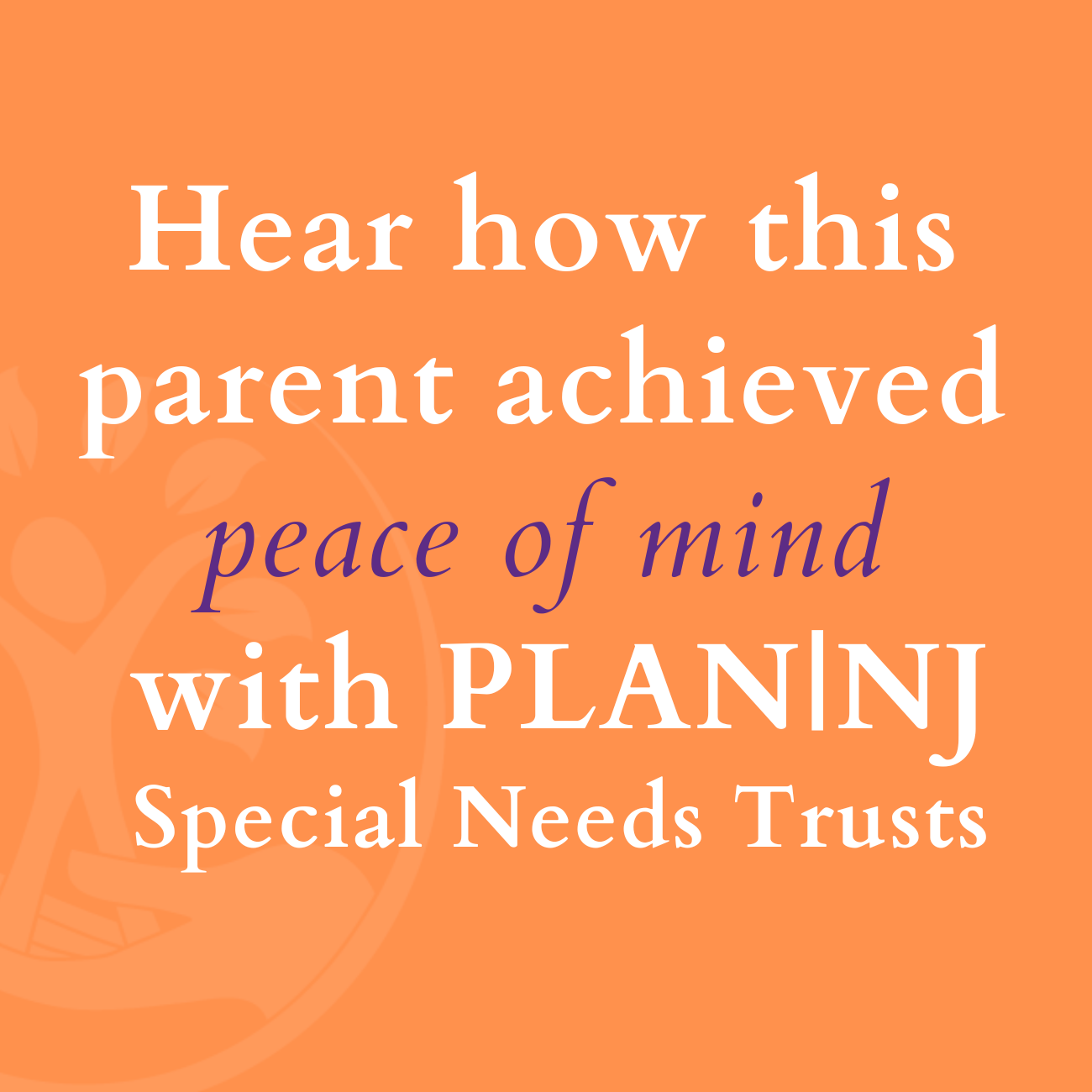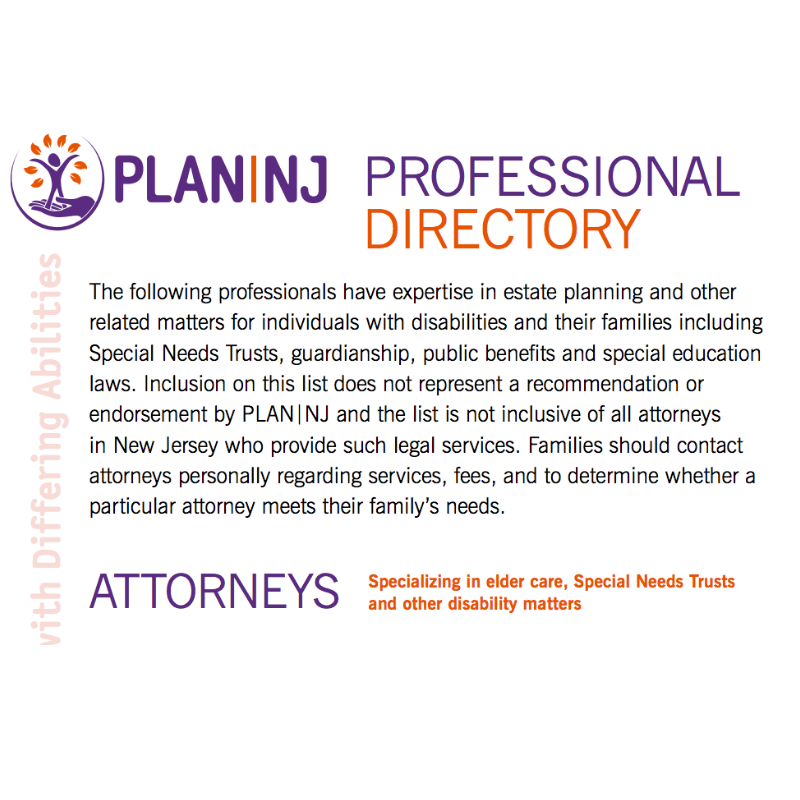
PLANNING FOR THE FUTURE WITH PLAN|NJ: FREQUENTLY ASKED QUESTIONS
PLAN|NJ’s services and supports are comprehensive and complex. Every day, we hear from many people who seek a better understanding of what individuals with disabilities need and deserve.
Here are answers to Frequently Asked Questions to assist families and related services providers in legal, financial, home and community planning.

Frequently Asked Questions: Guardianship
Am I taking away my loved one’s independence?
Not necessarily. Guardianship is about protecting your loved one while promoting autonomy. The role of the Guardian is to foster as much independence and self-determination as possible by encouraging participation in decision-making.
_________
When do I file for guardianship? What happens during the gap between my child’s 18th birthday and the finalization of guardianship?
You cannot apply for Guardianship until your child’s eighteenth birthday. In the rare instance that Guardianship is required during the gap, such as a medical emergency, you can file to obtain emergency temporary Guardianship.
_________
If my spouse and I are divorced and have joint custody, do we automatically become co-guardians?
Joint custody does not predetermine co-Guardianship. Many other issues come into determination of Guardianship, including preference of the individual. The court appointed attorney, and in some cases a guardian ad litem, will report to the court as to the preferences and best interest of the alleged incapacitated person.
_________
How do I choose a Successor Guardian?
Always select someone who is capable and willing – who knows your child well and will do what is best for your child. You do not need to designate the same person in the different Guardianship roles; you can have a Guardian of Person who is different from the Guardian of Estate (Property), based on each individual’s areas of strength. Always designate multiple successors, should some be unable or unavailable to serve when the time comes. Whenever possible, designate individuals who are younger or closer in age to your child. If you run out of family members to serve in the Guardianship roles, consider an agency like PLAN/NJ.
_________
How do co-guardians differ from successor guardians?
After the appointment of a guardian or co-guardians, additional guardians can be added later, but an application must be made to the court to request the addition. A guardian may designate a successor guardian in his or her will, but the appointment of a successor guardian must also be made by the court. The advantage of adding a co-guardian is the ability of the guardian to train the co-guardian while the guardian is still alive. The disadvantage is that the guardian must make decisions together with the co-guardian. When co-guardians are appointed by a judge and one later dies, court intervention is not required to remove the co-guardian; rather, a letter to the surrogate court notifying of the death of the co-guardian is all that is required in most cases.
_________
What is a standby guardian?
A standby guardian is an individual appointed by a parent temporarily for the benefit of his or her child, in the event that the parent dies, becomes incapacitated or is unable to care for the child while still alive. The standby guardian may have concurrent decision-making authority with the disabled parent, as opposed to having the sole responsibility. The standby guardian is temporary until a permanent guardian is appointed.
_________
Do I need a lawyer to obtain guardianship?
No. You can obtain “pro se” Guardianship of the person and estate for an individual eligible for DDD services through your local surrogate’s office. All of the forms necessary, which are the same forms that attorneys use, are available online at the link below:
https://www.njcourts.gov/forms/10558_guardianship_person_and_estate.pdf
Frequently Asked Questions: Special Needs Trusts
“What happens if I do not create a Special Needs Trust?”
If you do not create a Special Needs Trust, the portion of your Estate designated to benefit your child with special needs will be distributed directly to him and it will put the individual’s means-tested benefits in jeopardy due to over-resourcing. As a result, any means-tested benefits could be terminated due to having more than $2,000 in assets per SSA and Medicaid guidelines. Therefore, future decision-makers would be required to create a First Party Special Needs Trust, which is subject to a Medicaid lien with the individual’s assets to preserve their original benefits.
_________
“How do I choose a Trustee?”
It is important to choose a Trustee who knows the laws and will keep current with changing regulations governing Special Needs Trusts. The Trustee will ensure the trust is appropriately administered in order to maintain public benefits. It may be advisable to select a trustee who is not a family member to help avoid tension in family relationships. As with Guardianship, plan for a line of successors in the Trustee role and consider an agency like PLAN|NJ if you have limited successors available.
_________
“Does the Trustee get paid?”
Trustees are entitled to compensation or no compensation pursuant to the terms of the trust agreement. In the absence of any express provision concerning compensation in the Trust Document, the trustee is entitled to commissions set forth in the New Jersey statutes.
_________
“Is there any way my family member can have oversight of the Trust but not serve as the Trustee?”
Yes. You can designate a family member as a Trust Protector to ensure the Trustee is managing the Trust responsibly. The Trust Protector would not be responsible for the day-to-day distributions, maintenance and investment of the trust but would have oversight and the ability to question the Trust management should an issue arise.
_________
“Can I pay for housing from a SNT?”
You can pay for housing from a Special Needs Trust, but it may affect an individual’s public benefits. Since this is very case specific, a Trustee should always seek legal advice when considering this.
_________
“Can I put money from a SNT into an ABLE account?”
Yes. You can transfer money from a Special Needs Trust to an ABLE account. The transfer must not exceed the maximum allowable per year ($15,000). Transfers to an ABLE account are subject to Medicaid repayment upon the individual’s death. If the transfer is from a First Party Trust to an ABLE account and it is for $5,000 or higher, the trustee must notify the State Medicaid Legal and Regulatory Office pursuant to regulations.
Frequently Asked Questions: ABLE Accounts
“Do I need an SNT if I have an ABLE account?”
There are limits on the amount of money that can be deposited into an ABLE account in a given year ($15,000). A Special Needs Trust is advisable if you intend to leave assets in excess of the ABLE limits. Also, a Trust, unlike an ABLE account, would not be subject to Medicaid Recovery, if the Trust is a Third-Party Special Needs Trust. ABLE accounts can only be established for individuals who have a proven disability with an onset prior to the age of 26.
_________
“Can I pay for housing with an ABLE account?”
Parents can put money into an ABLE account, and it can be used for rent without the In-kind Support and Maintenance reduction to Supplemental Security Income (SSI).
_________
“Does my child have control over the funds in an ABLE account?”
An ABLE account provides the individual with some choice and control over the ABLE funds that he or she would not have with a Trust, since the Trustee makes the decisions regarding spending. If your child has a Guardian, the Guardian would have oversight of the ABLE account.
_________
“Who can establish an ABLE account?”
An eligible individual with a disability; an individual selected by the eligible individual with legal capacity to establish or serve as the person with signature authority over the account; an eligible individual’s agent under a power of attorney, conservator or legal guardianship; a spouse, parent, sibling or grandparent of a minor; or a representative payee (individual or organization).
_________
“How can I get more information on ABLE accounts?”
You can learn more about ABLE accounts by visiting the ABLE National Resource Center or NJ ABLE
For more information, contact PLAN|NJ at 908-575-8300.
CIRCLE OF SUPPORT
our story
"A Talk With Families"
The stories of three families with loved ones who have disabilities and who use PLAN|NJ's trust administration and care coordination services are told through interviews conducted in their homes by Executive Director Ellen Nalven.

GET IN TOUCH
Planned Lifetime Assistance Network of New Jersey PLAN|NJ
PO Box 547
Somerville, NJ 08876-0547
908-575-8300 (Phone)
908-927-9010 (Fax)
info@plannj.org
PROUD MEMBERS OF:
Alliance for the Betterment of Citizens with Disabilities
Association of People Supporting Employment First
Alliance for Pooled Trusts
National Alliance on Mental Illness
National Guardianship Association
National PLAN Alliance
Supportive Housing Association of New Jersey
SOMETHING MISSING? LET US KNOW.
We work hard to provide relevant and current information. If you feel something is missing or needs to be corrected, please contact us via our contact form HERE.
PLAN|NJ = Lifetime Advocacy for People with Disabilities
OUR MISSION
PLAN|NJ’s mission is to help family members of people with disabilities answer the question:
“Who will care for my loved one when I'm gone?”
We coordinate the supports needed by individuals with intellectual, developmental and physical disabilities, and challenges with mental health, including people with autism, cerebral palsy, traumatic brain injury, severe mental illness and more.
Spanish Translation
Si usted habla español y quisiera mas información sobre nuestros servicios o si desea una consulta con PLAN\NJ, por favor comuníquese con
Nancy Dilliplane, Director of Trust Services, para asistencia bilingüe: 908-575-8300, extensión 15
nancy.dilliplane@plannj.org
